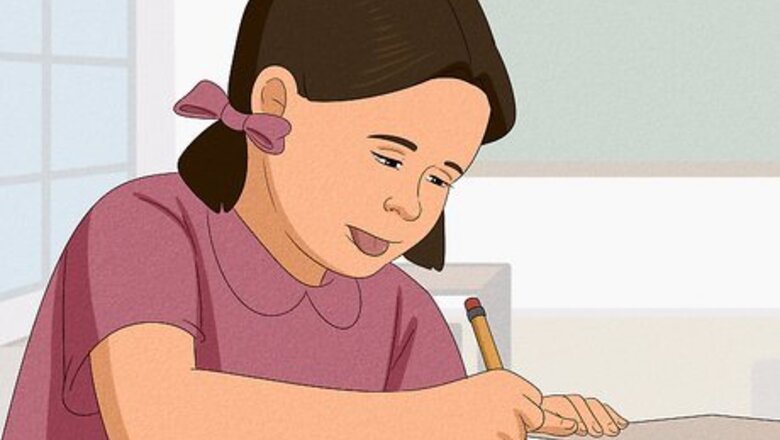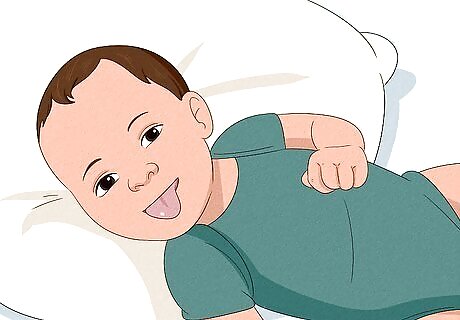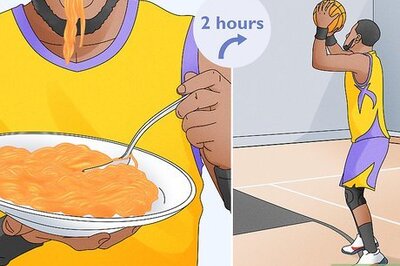
views
- Sticking out your tongue may indicate concentration, as scientists believe the action helps people think.
- Showing a tongue can be a sign of silliness, flirtatiousness, or rudeness.
- Babies stick out their tongues when trying to imitate you, are hungry, or have trouble breathing out of their nose.
Reasons People Stick Out Their Tongues

They’re concentrating. Sometimes, people stick out their tongues without thinking about it if they’re lost in a thought or task. They do the action compulsively and likely don’t have any idea they’re doing it. Some psychologists believe this is because the tongue stimulates communication in the brain, making it easier to think and process thoughts. This behavior is more common in children, as researchers believe adults learn to suppress their tongue protrusions with age to match cultural and societal standards.

They’re being silly. More often than not, someone sticks out their tongue if they’re feeling a little goofy. They might show their tongue after telling a joke or making silly comments or gestures. It’s a comical action that says, “I’m just kidding, you guys!”

They’re flirting. Say someone cute sticks their tongue out at you, then gives you a playful wink or smile. In this case, they’re likely flirting with you—they’re teasing you in the best way possible! More often than not, this is an innocent and flirtatious gesture that comes after a compliment or playful joke; however, it can also be used sexually when paired with an innuendo or sensual comment.

They’re being cute. A child or crush will likely stick their tongue out at you if they’re trying to be adorable or likable. The action is typically given after a sweet or innocent comment meant to make you smile.

They’re being rude. In some instances, a person may stick their tongue out at you if they’re mocking or teasing you. The gesture is meant to get under your skin and make your skin crawl. Chances are, if someone’s being harsh or mean to you and then sticks out their tongue, they’re doing so maliciously.

They’re taunting you. Someone sticking out their tongue can be seen as a playful or mean gesture. A crush sticking out their tongue with a cute scrunch of their nose can be a playful taunt, especially when paired with a flirtatious comment. However, a child sticking out their tongue after kicking your shin or making a rude comment can translate to mean “Nana nana boo boo!”

They’re greeting you. In Tibet, sticking out your tongue is a sign of greeting or respect. This ancient tradition dates back to the 9th century during King Lang Darma’s reign. The king, who was known for his cruelty, had a black tongue, and the people were worried he would be reincarnated after he died. The custom of sticking out your tongue began as a way for Tibetans to make sure you weren't the reincarnated king.
Why do babies stick out their tongues?

Babies stick out their tongues when they’re mostly hungry or playful. When you see a baby sticking out their tongue, it’s no cause to panic—this is a natural occurrence. More often than not, a baby will show you their tongue for one of these reasons: They’re imitating you. If a baby’s feeling playful or curious, they’ll stick out their tongue if they see you sticking out yours. They might be trying to mimic you through sound or motion. They’re hungry. When babies stick out their tongues or open and close their mouths repeatedly, they might be hungry. Check for other signs of hunger, such as putting their hands to their mouth or reaching for a bottle or breast. They’re teething. A baby showing you their tongue may be a sign that they’re growing teeth. They likely don’t mean to stick out their tongue; they’re just trying to feel what’s happening in their gums. Look for other signs of teething, like crankiness. They’re breathing. If a baby can’t breathe through their nose, they might stick out their tongue as they breathe through their mouth. This could be a sign of congestion, large tonsils, or a blocked nasal passage. Contact your doctor if your baby has trouble breathing. They have a tongue-tie. Constant tongue protrusion may be a sign that your baby has a tongue-tie (ankyloglossia), where the skin beneath the baby’s tongue is shorter than usual. Talk to your doctor if you believe your baby has this. They have macroglossia. Macroglossia is a rare condition when a person has a large tongue and can be a sign of Down syndrome, hypothyroidism, and Beckwith-Wiedemann syndrome. Talk to your doctor if you think your baby may have this. They have micrognathia. Micrognathia is a condition where someone’s jaw is smaller than normal and may develop in babies with Pierre Robin Sequence or cleft palate. Contact your doctor if you think your baby may have this.




















Comments
0 comment